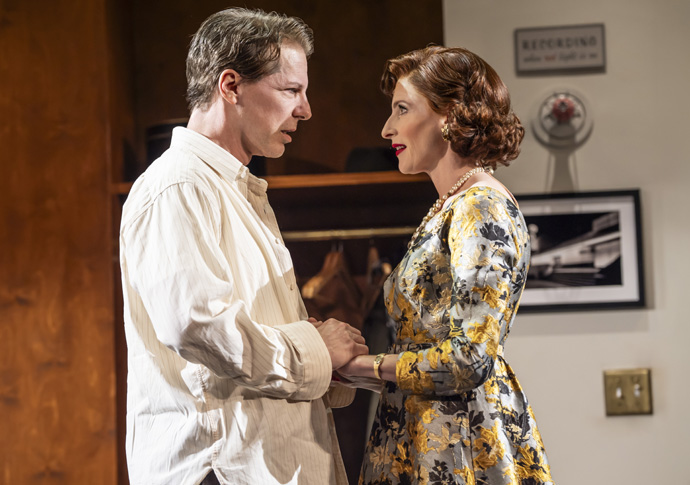Review: Good Night, Oscar, at Barbican Theatre
Absorbing play set in 1958 offers a fascinating insight into the shadows that haunted brilliant concert pianist
Friday, 15th August 2025 — By Lucy Popescu

Sean Hayes as Oscar Levant and Rosalie Craig as June Levant [Johan Persson]
OSCAR Levant – a brilliant American concert pianist and volatile actor known for his roles in Rhapsody in Blue, An American in Paris, and The Band Wagon – is perhaps less familiar to British audiences.
Set in 1958, Doug Wright’s absorbing play, Good Night, Oscar, offers a fascinating insight into the shadows that haunted him. It explores the personal cost of celebrity and the impact of television’s rise as a dominant entertainment force, fuelled by the demand for ratings.
Jack Paar (Ben Rappaport), host of The Tonight Show, invites Oscar (Sean Hayes) onto the programme unaware that Oscar’s wife June (Rosalie Craig) has had him sectioned in a psychiatric institution.
Undeterred, June arranges a four-hour pass, and Oscar arrives at the studio accompanied by his nurse Alvin (Daniel Adeousun). Hayes – celebrated for his role as Jack in the TV hit Will and Grace – brilliantly conveys Levant’s inner turmoil though tics and tremors.
Network boss Bob Sarnoff (Richard Katz) fears that Oscar, notorious for his scathing humour, will speak out of turn, while his star- struck nephew Max (Eric Sirakian), a studio assistant, runs between dressing rooms trying to keep everyone happy.
Addicted to prescription drugs, unable to silence his relentless thoughts, and tormented by memories of his musical collaborator, George Gershwin (David Burnett), Oscar loses himself in imaginary conversations with his deceased friend.
What follows is a painfully public breakdown on live television, redeemed by a breathtaking piano finale – his virtuosity undimmed by electroconvulsive therapy and drugs.
Hayes, reprising his Tony Award-winning Broadway role, gives a pitch-perfect performance; his background as a classically trained pianist in evidence.
In Lisa Peterson’s sleek production, Rachel Hauck’s meticulous television studio, designed to resemble a giant padded cell, serves as a powerful visual metaphor for the play’s central tension.
Until September 21
barbican.org.uk